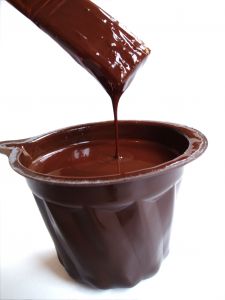Xoqolat


Viktor Medrano
Xoqolat /ʃo.ko.'lat/ is a means of code-switching between Interlingua and Lojban. The whole repertoire of Lojban 'cmavo' is available for Xoqolat.
The speaker or writer is completely free to use various attitudinals, tenses, and evidentials in the 'cmavo' list.
In Xoqolat, Lojban-derived words are called Purple words, whilst Interlingua-derived words are called Blue words.
Some orthographic changes have been made in Interlingua for Xoqolat's Blue words: hard 'c' has become 'q', hard 'ch' has become 'q', soft 'ch' has become 'x', 'ph' has become 'f', the ending '-tion' has become '-xion', '-tia-' has become '-xia-', '-tio-' has become '-xio-', the ending '-tate' for abstract nouns has become '-tat', and the ending '-tude' for abstract nouns has become '-tud'.
The word for 'and' has been changed from 'e' to 'i'.
Stress, accentuation, in Blue words is not the same as in Interlingua. Accentuation, like French, is always at the last syllable. So, 'angeliq' is /ə̃.Ʒə.'lik/. And 'troppo' is /trop.'po/.
Vowels and diphthongs that precede an 'n' or 'm' within the same syllable are always nasalized, so that the set /a e ə i o u/ maps to the set /ã ẽ ə̃ ĩ õ ũ/ and corresponding diphthongs become nasalized.
There are some influences from Castillian, Catalan, and Greek. In Blue words, 'x' is pronounced as 'sh' in English 'ship'. So, 'emoxion' is /ə.mo.'ʃjõ/. Both 'c' and 'th' are pronounced as 'th' /θ/ in English 'thing'. The 'z' is /z/. The 'q' is pronounced as /k/. The combination 'qu' is always pronounced as /kw/; for example, 'que' is /kwə/. The 'h' is always pronounced as /h/, never silent. Double consonants are pronounced distinctly double; for example, 'belle' is /bəl.'le/. In Blue words, unstressed 'a' and 'e' have the 'Schwa' sound /ə/. (Even diphthongs are affected: 'europee' /əw.ro.pə.'e/, 'qausa' /kəw.'za/.) And 's' between vowels within a word has the /z/ sound. The couple 'ss' is always /s/. The 'h' as consonant by itself is always pronounced as /h/: 'homine' /ho.mi.'ne/.
Pronunciation of Blue Words:
| a | stressed /a/, unstressed /ə/ |
| b | /b/ |
| c | /θ/ |
| d | /d/ |
| e | stressed /e/, unstressed /ə/ |
| f | /f/ |
| g | /g/ before 'a, o, u', /ʒ/ before 'e, i' |
| h | /h/ |
| i | /i/, but /j/ in diphthongs |
| j | /Ʒ/ |
| k | /k/ |
| l | /l/ |
| m | /m/ |
| n | /n/ |
| o | /o/ |
| p | /p/ |
| q | /k/ |
| r | /r/ or /ɽ/ |
| s | /z/ between vowels within a word, but /s/ elsewhere and in doubled 'ss' |
| t | /t/ |
| u | /u/, but /w/ in diphthongs |
| v | /v/ |
| w | /w/ |
| x | /ʃ/ |
| y | /i/, but /j/ in diphthongs |
| z | /z/ |
Purple words are always pronounced with their native Lojban sound values as if they were embedded foreign words.
In Xoqolat, verbs are not conjugated as in Interlingua. The Interlingua 'present tense' form of the verb is used in conjunction with various Purple words to produce tense variations when required. Tense is optional as in Lojban.
As a matter of aesthetics, Xoqolat sentences do not usually start with capital letters, which are reserved for proper nouns and titles of works, etc.
diqxionario | cmavo | exemplo
This project was initiated on 2008-04-07 and was last modified on 2010-10-11.